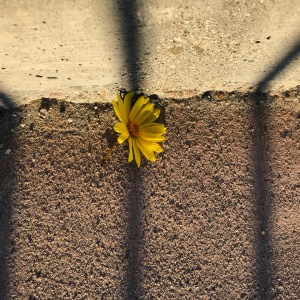 MICHEL
MICHEL
By Cody Pease
Michel waters the plants in rotations. He starts with the tillandsias hanging in the copper-wire cages, then the oreganos and vanilla orchids near the south-facing window, then the begonia on the dining room table. The succulents need to be split, and the philodendrons need more sunlight. His hands are too weak to lift the watering pot; instead, he uses a wine glass like I showed him. It’s a small task to strengthen his muscles. “How are you doing?” His movements are slight and slow, but he smiles. “Well,” he says. I’m afraid to press him further. I leave him to water, then I peel the sweet potatoes for dinner.
*
One morning, Michel clutches a bedsheet to his mouth. He apologizes for waking me, but I’ve been awake since dawn. I had mistaken the sound of his coughing for cannons ringing in a dream. The difference is subtle. He’s confused and flushed, his skin thick with sweat. I wrap an arm around him as he spits blood into the sheet. We listen to the rain and thunder clamor outside, the tree branches scratching against the glass, the leaves skittering in the wind. Spring is here.
*
Days pass without warning, a monotonous routine. I lose myself in all of it. He sleeps past noon. Then I follow him as he ambles throughout the house, spraying the doorknobs and countertops, the stairway railing and armrests, wherever he lays his hands, wherever he breathes. I empty two bottles of cleaning spray within the first nine days since the hospital visit. I cook his meals: gluten-free, sugar-free, free of meat and eggs. I wash his clothes with scent-free detergent. I wash his body with only warm water, once in the morning and again at night. I buy a new bed, a firm bed to support his spine. Instead of wrapping myself around him and breathing in the nape of his neck, I keep two feet between us and hold his hand.
*
Summer brings intense heat and Michel’s death. I struggle to keep the plants hydrated. The tillandsias’ tendrils curl and pucker. The philodendron’s leaves darken and become brittle. I read an article on how to keep plants alive in three simple steps. But it forgets to explain what to do if the caretaker dies. It forgets to explain why the plants deserve to live. It forgets to explain how I am to stop myself from destroying all of these plants. Later that night, the neighbor calls and asks about the noise. “Are you and Michel okay?”
*
A friend comes over in the morning to help me clean. He lights lavender incense, builds cardboard boxes to store Michel’s books and snowglobes, folds his shirts, prays. He polishes his shoes, makes the bed, throws away the blood-stained sheets. He holds me for a long time. He cooks me lentil soup and cleans the dishes. He leaves the plants for last. I confess to him that I’m afraid I will disappear if I were to close my eyes. He takes my hand in his and places it against my chest. “I know.”
*
Two summers ago, Michel and I walked through the forest behind our house. We walked for miles until we came upon an alcove near the mouth of the stream, shadowed by the thick canopy of sugar maples. We sat in the grass and dipped our toes in the cool water and read poetry. An hour passed before he said, “I’m dying.”
*
I remove the plastic wrap from the glass dish and place it in the microwave. A sweet potato casserole. The same dinner I’ve eaten the past four days. I’m still unable to cook for only myself. I pour myself a glass of wine. A new succulent sits on the dining room table, near the south-facing window, where sunlight catches on the empty, copper-wire cages. A plant which needs little water. A plant whose fallen leaves will grow new succulents. An easy and forgettable plant. The casserole is mushy, like eating baby food. The wine is bitter.
 HEART OF EAST BURNSIDE
HEART OF EAST BURNSIDE
By Noel Alcoba
Alternate history: The 2010 Prohibition Act drives craft distilleries underground.
Portland. City of bridges to nowhere. My name is Holden Heart. Private detective.
I was ready to shutter my cramped box of a shop on East Burnside, when she walked in. She was five-four, about a buck and a quarter, cherrywood hair in a pixie cut. I could tell she was well bred, despite the sleeve-tat, which was more yoga instructor than women’s prison.
“I’m Kacey Kraft,” she said, “I own KombuchaKraft. I emailed you.”
“Server’s been down all day. Come back tomorrow.”
“You gotta help me, Mr. Heart. My brother, Karcher, he’s hurt real bad. They stabbed him with a kale stripper, then broke a mason jar over his head!”
“They, who?”
“Who else? The food truck syndicate!”
Of course. For a decade, unemployed brogrammers from Seattle started spreading down here like poisonous mushrooms, using food trucks as fronts for their black market libation hustle. Now they ran Portland’s protection racket.
“It was Filson Mack,” she added, “from Mac ’n Grind. They make artisan subs using mac ’n cheese instead of bread.
“Sounds awful. So does Filson.”
“Filson came by to collect, but Karcher had to play the hero. Now my brother’s in the ICU breathing through a tube!” she sobbed.
“Then call the cops.”
“The Hipster Mob owns all the badges in Portland. No offense.”
“None taken. Left the force years ago.”
“I know. That’s why I came to you.”
“Miss Kraft, I investigate cheating husbands. Deadbeats. You’re looking for a hired gun.”
“I’ve got a thousand, cash,” she said, noticing my cheap desk and cracked walls.
“Looks like you could use the money.”
“Nothing duct tape and Lysol can’t fix.”
“I’ve done my homework, Mr. Heart. You’ve … killed before.”
“Check your homework again. Charges were dropped.”
She took my arm and leaned in. She smelled like lavender and rosemary.
“Miss Kraft … ”
“Call me Kacey.”
“Miss Kraft, I’m very sorry about your brother, but I can’t help you. My advice? Get your brother, leave town. Portland’s no place for a girl like you. Goodnight.”
*
Next morning Miss Kraft was already waiting outside my office.
“Miss Kraft, I already told you … ”
Then I saw the black eye. Her arm was in a sling.
“Did Filson do this to you?” I said, gritting my teeth.
She reached into her purse. “Here’s a grand. I have more.”
“Keep the paper cabbage. Just point me to the bastard.”
*
Filson was on Marine Drive, working out of a storage unit converted into a makeshift distillery. A pine dresser against the wall showcased a row of mason jars filled with clear liquid, and dried herbs on a cutting board.
“We’re closed.”
“Your door wasn’t,” I said. “What’s in the jars?”
“Varnish. Repurposing this mid-century cabinet.”
“Right. Since when is Ikea mid-century?”
“Since I told you we’re closed,” he said, sealing a mason jar.
“How about you leave Kacey Kraft alone?”
Filson turned around slowly. “Look, you tell the Kombucha queen I’ve said all I have to say to her.”
“Breaking her arm’s a hell of a way to express yourself,” I said, stepping forward.
Filson hurled the jar at my head. I ducked in time to see him snatch a small knife from the cutting board and lunge at me. I caught him by the wrist, and twisted his arm behind him. He jammed his other elbow into my ribs, forcing me to release him. Before I could regain my stance, he tackled me to the floor, holding the knife inches from my eye.
“Pretty strong for a guy in skinny jeans,” I grunted.
“Crossfit, three times a week.”
“Is that so?”
I grabbed his beard, pushing his head back like a Pez dispenser, and threw him onto his back. He sprung up, pounced on me again, but by the time he realized his knife hand was empty, I jammed the blade between his ribs. He wheezed, then tumbled onto his back.
“Tell your … sister … to go to hell … ” he gurgled, clutching his chest, blood gushing between his fingers.
“My sister?”
*
I drove, numb-faced, meandering through a barrage of chaotic thoughts and blurred street signs. I must have covered every inch of the city before finding my way to Kacey’s.
The heavy scent of rosemary and lavender led me to her garage. She was tending an elaborate network of brass vats, pipes, and pressure valves. Visibly absent was her arm sling.
“You heal fast,” I said.
“Just got tired of the sling.”
“And I just buried a knife in some guy that thought I was your brother! TALK.”
“I warned him to pay up,” she said, keeping her back to me, “or I’d send my ‘brother’ to gut him.”
“So the whole ‘brother in the ICU’ thing was a barrel of whiskey wash?”
“You should’ve done your homework, Mr. Heart. I always do. Knew you were a sucker for a damsel in distress.”
“I JUST KILLED A GUY!”
“Not like it was your first. But that was sweet, taking care of my competition for me.” She grabbed some dried herbs, crushed them in her hand, and breathed in the scent. “This town’s too small for TWO rosemary-lavender infused gins.”
“Gin leaves a bad taste in my mouth.”
“But cash shouldn’t.”
“Not looking to be your errand boy.”
“I know where you live.”
“And I know how you operate,” I said, letting myself out.
*
The newspapers buried Filson Mack’s homicide on page six, dismissing it as just another one of Portland’s growing number of unsolved gangland killings. All leads were dead ends. Just like the bridges in this city, they went nowhere.
And neither was I.
My name is Holden Heart. I’m a private detective.
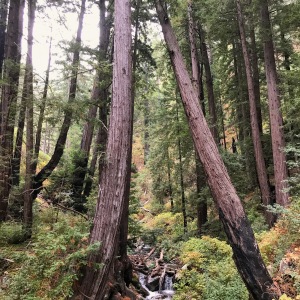 The Crucial Thing
The Crucial Thing
By Sue Mell
Hating the city university, I hoped to transfer to a small arty college in Vermont. Interview—yay, Greyhound—boo, I thumbs-up and -downed Tommy at the student union. He’d grown up on the same block as my oldest friend, been the winsome subject of our preteen fantasies, and become a painfully quiet sophomore. Years later, navigating such swamps myself, I’d recognize depression; back then, I was merely stunned by his offer to drive.
“It’s over three hours each way.”
“That’s cool. Just chip in for gas.”
A week later, we were on the Taconic.
“Can I show you something?” Tommy said.
“That’s a leading question.”
He blushed. “A place. Not far from here. Maybe on the way back?”
Having gone to camp nearby, I knew the exit. “Bash Bish Falls?”
“Something else.”
Always a price, I thought. “Can we see how it goes?”
“Sure,” he said. “Your interview. That’s the crucial thing.”
Instead of wishing me luck, Tommy held up his fist. When I was done, he was patiently leaning against the car, beige corduroy jacket slung over one shoulder, red plaid flannel shirtsleeves rolled up—a fairy-tale woodsman among the pines.
“Pretty cool place.” He’d walked around campus—more than I’d thought to do. “I’m sure you aced it.”
“Hardly.” We’d passed a Tastee Freez in town. “Feel like getting a milkshake?”
“Sure.”
“Cool,” I teased, unnoted.
Neither shared malts, nor my squeaking accompaniment to Minnie Riperton’s “Loving You,” eased Tommy’s discomfiture. Nearing the exit for the falls, he cracked his neck and straightened his arms, stretching against the wheel.
“We’ll stop,” I said. “Okay?”
Like a conductor, he raised his hand, the smallest smile gracing his lips as he put on the blinker.
A late, wet spring had made the trees glorious. Leaving the car at a scenic vista, we traced a muddy trail, our footsteps echoing on roughhewn boards bridging a stream, the smell of earth, the call of robins rich around us.
“Should be right up here, somewhere.”
“Not entirely convincing.”
Tommy held back a bramble. “I promise.”
I wanted to turn back, but he pointed past a stand of birch to the vine-covered ruins of a small stone house.
“Right?” he said, triumphant.
The roof was gone, and only one wall high enough to boast a window, but you got a sense of enclosure when you stepped inside. Despite the charred circle from countless campfires, the empty beer cans, it had a magical feeling.
“There’s supposed to be silver hidden here, but no one’s ever found it.”
“Who lived here?”
“No one knows.”
“Well, someone knows.”
Tommy winced, and like most of what I’d said that day—to him, to my interviewer—I regretted the remark.
“Should we look?” I said.
“If you want.”
“It’s a great place.”
“It is,” he said, but wouldn’t meet my gaze.
I tried to settle on the window ledge, but the stone gave way.
“Holy crap,” Tommy said. A chunk of stones had broken off, revealing a hollow and a handful of thick silver coins.
“This is a joke—you did this.”
Like the wall, his face had opened, unmasking the kid I remembered from his parents’ stoop. “I wouldn’t—I couldn’t.”
“Go on, then,” I said.
He scooped them up. “Heavy.”
I held out my hands and he poured them in.
“Cold,” I said.
Tommy laughed, making me want to hug him, maybe more.
“What’ll we do?” I was already imagining their worth, how we’d spend the money.
“What’ll we do? We’ll put them back.”
“We will?”
His face closed over, his younger self gone. “They belong to the house.”
“But someone else will just—”
“Doesn’t matter. You don’t see that?”
“I guess.”
He cupped his hands and I returned them. Dispelling dust, or maybe making a wish, Tommy blew across the coins, then poured them back, their ring piercing the damp air. He reassembled mortar and rock, arranged trailing vines.
“We should go,” he said.
“You’re the boss.”
In the silence of the drive back, I fell asleep, waking to darkness, and a huffing city bus, in front of the aluminum-sided house where I shared the upstairs unit with my ex-high school boyfriend and two sanctimonious vegans.
“Thanks for taking me.”
Tommy nodded, a perfunctory gesture that gutted me. The bus heaved forward with a hydraulic screech. I got out.
“Wait,” I said, slapping the roof, as he began to pull away. I came around to his window, motioned to roll it down.
“What?” he said, an exhausted syllable.
“I need to pay you for gas.”
“Forget it,” he said.
But I never did.
 Turbulence
Turbulence
By Phebe Jewell
The flight attendants dance in the aisle. Muriel is the only one watching their routine, memorizing the emergency exits. Everyone else is lost in their laptops or skimming the sky magazine filled with glossy photos of everything you need but never knew existed. Travel beds for your yellow lab. Giant plastic claws on long sticks to reach the highest shelf, ponchos that turn into sleeping bags.
When was the last time she flew? Sometime in the 90s before Candy was born. And here she is, flying across the country to get Candy’s baby, Briana. Candy’s gone under again, and no one knows if she’ll surface. Muriel’s too old for a baby, but someone’s got to raise that child.
She catches the eye of one of the attendants, a slim 20-something hunk. How long ago did men start serving drinks and helping you stow luggage in the overhead bins? Keep it going, Muriel. Keep your brain busy so you won’t think about crashing. She locks eyes on his. Save me. Do more than bring me salted nuts and sparkling water. Open the hatch, push me down the slide if an engine goes out over water.
Really, Muriel. West Coast to East Coast, there’s no ocean. The Mississippi. Wider than a mile. Might need a slide if we take a nose dive into Moon River. Settling into her window seat, she watches the ground crew load the last of the baggage. Smart to travel light. She’ll be loaded down when she returns. If she makes it all the way to Baltimore, that is. Stop it. Around her people laugh, joke. It’s a party at ten thousand feet or whatever cruising altitude the plane will rise to. The man next to her is already asleep.
The pilot is speaking now. Seats back and seatbelts clicked. Carry-on wedged under the seat in front of her. Deep breaths. She should have taken the train, but there wasn’t time. Don’t think about the big fat carbon footprint you’re leaving. Just get me and Briana home safe and I promise I’ll never fly again.
The attendants are strapping themselves into their seats by the galley. Now or never. As the plane rumbles along the tarmac, two little boys fight for a view from the window, their mother calm. “We’ll switch before we land.” Muriel was never that mother. Always anxious, distracted. Drunk. No wonder Candy’s a mess. The jet picks up speed on the runway, turns, then stops. Something wrong? No. Waiting for clearance. The engines rev underneath her. The pressure of speed pushes her back against her seat.
A bump as the wheels retract and then the plane is up. Too late to change her mind. She closes her eyes. When she opens them again the terminal already looks like a child’s playset. The plane breaks through the gray clouds, windows flecked with rain. What is she going to do with a baby? She has her own life now. She’s fought hard to be alone. Safe. She can’t be responsible for another child. Look what happened to Candy. Some women would want a do over. Not Muriel. She’s finally got it together.
The plane reaches a cruising altitude. Below her lightning illuminates a dark cloud. The people in the row behind her talk and laugh. The two boys across from her are plugged into their phones. What was she thinking? Girls are easy until puberty kicks in, then it’s a whole other game. Candy sneaking out. Skipping class. Getting into cars with any boy who smiled at her, offered her a sip, a hit.
Muriel doesn’t know anything about the baby’s father, doesn’t really care. From the one picture Candy sent after Briana was born, Muriel recognizes the square family chin, daring the world. Can she take on this child without damaging her? The handsome attendant comes by with his cart, bottles clinking. That seductive sound murmuring there’s nothing wrong with a little buzz to take off the edge. Life is hard. Life is short. Just one little drink.
“Ma’am, what would you like?”
“Just some sparkling water, please.” Good job, Muriel. One day at a time, even the scariest day of your life.
The cabin shakes.
“Is everything going to be ok?” she asks, the words slipping out before she can stop them.
“Yes ma’am. Just a little turbulence over the Cascades.” He smiles, pouring water in one smooth gesture. She nods, reddening as she reaches for the cup. So silly to get all stirred up over nothing. The attendant proceeds down the aisle, laughter filling the cabin as he serves other passengers, his trim body adjusting to each jolt. All part of the job. Leaning back, Muriel sips her water. She can fit a crib in her bedroom.
One of the boys across the aisle rouses himself from his screen. “I gotta pee,” he nudges his sleeping mother. “Mom, I really gotta go.” The mother stares bleary-eyed, stands up half asleep. Muriel watches the two make their way down the aisle, the little boy’s hand pressed to his crotch. Soon she’ll be sleepwalking like that. Remembering the angle of Briana’s jaw, Muriel smiles. That girl’s gonna be a firecracker. Good thing she’s sober now.
Muriel stares out the window, craning to find signs of snow-capped mountains below, but all she sees are the tops of dark gray clouds. The plane banks to the right, and suddenly she is looking straight up into blue sky disappearing into black. When the plane rattles again, she hardly notices, enthralled by the endless space stretching above.
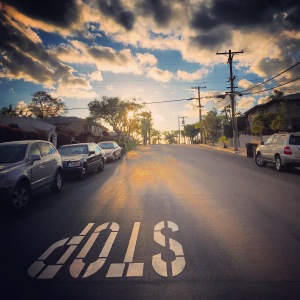 Cherry Tomatoes
Cherry Tomatoes
By Amy L. Clark
What does dead feel like?
My daughter’s therapist has instructed me to ask that when my daughter professes a wish to kill herself.
I haven’t had occasion this week to use the line on my kid. But since it was suggested to me, I can’t stop asking. “What does dead feel like?” I ask the boneless, skinless chicken breasts, wrapped and chilled in my hand in the supermarket. “What does dead feel like?” I whisper to the faces of ripe cherry tomatoes as I pluck them from their vine in my yard. “What does dead feel like?” I say, closing my eyes and letting myself float in a tepid bath.
Later, my daughter, content for the moment with a carton of chocolate milk in one hand and a raspberry-filled granola bar protruding from her mouth, shows me videos of cartoon cats playing the bongos, the saxophone, the kalimba. Riding atop cartoon vans, these cats thwap out theme songs, eighties hits, trance music, death metal. I think of all the things that have had to happen in the history of human life for these videos to be created. Each one took hours to code, to generate. Hundreds of researchers discovered or invented the mechanisms by which these moments were designed and beamed into the hands of my twelve-year-old, and from there into my retina, where they are processed by my one brain. “Do you really think we couldn’t have cured cancer?” I want to ask. Now this, this human collective, it seems to me, is a species with a death wish.
My daughter crumples the granola bar wrapper and shoves it into her pocket. She covers my hand with one of her own, sticky and soft. I work hard to arrange my features into what I hope is look of appreciation. “It’s great,” I say, unfolding myself from the couch, thinking of that chilly chicken breast that I’ll need to slide into a pan soon.
“You haven’t even seen the one with the teacup pig,” she says. Her face is shining with reflected light from her tiny screen, and I think of how long it takes for certain wavelengths to arrive from each cold star, and what will be left when they get here.
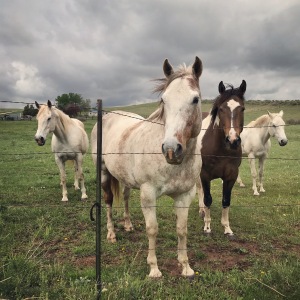 Carbon Horses and Metal Cars
Carbon Horses and Metal Cars
By Kara Bernard
The smell of hay and manure rushed through the open window as we came up on another horse trailer. It had been 476 miles since the Thoroughbred in Utah, and still I tensed thinking of what this one would bring.
Horses are honest creatures. They’ll tell you everything if you let them. Last week in Maine, a Tennessee Walker told me Nate would start coughing and wouldn’t be able to stop. In Colorado, a Palomino at a rest stop told me I’d regret my 48th birthday.
As hazy images of my future danced around my brain, my gaze drifted to Mom’s arm resting on the center console, her hand swallowed by the rough sausages that were my stepdad’s fingers. My dad’s, unlike John’s, were thin like cigarettes and stretched for miles across the piano. I used to think of him as a skeleton come to life. But now I know skeletons belong in the ground. That’s what the Arabian in South Dakota told me a month before Dad’s lung collapsed.
A sharp glint of sunlight reflected off the trailer as we matched its speed. I squinted, searching for those black, endless eyes, and I prayed for good news.
The shadows shifted as he stepped forward, a sleek Lexington with pink sores down his neck. He rested his muzzle against the rusted slats of the trailer and waited. His ear flicked. I looked away and slowed my breathing, wiping my hands on my jeans. A hoof banged against the trailer wall and scraped hard against the rough metal. I leaned back in my seat, and as the future started to come through, I closed my eyes and braced myself.
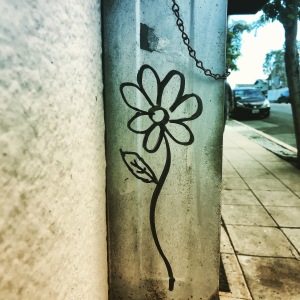 Moonlight Sonata
Moonlight Sonata
By Richard Risemberg
It was the night of the shooting that I realized I wasn’t patient, just tired.
It was August, the moon was full, and Los Angeles was torrid and dry, as usual at that time of year. Our apartment—I still thought of it as “our” apartment—was on the second-to-top floor of an unpretentious building in a part of town that desperately wanted to be pretentious. The building was on a hill, and our apartment—my apartment—looked down over the gridded swarm of lights that spread to a distant ocean invisible at midnight. Los Angeles, vast, brilliant, shooting sparks, a postcard view, but alive. Even the other high rises were below us, and no one could see into our balcony, not at night.
Anna and I used to make love on the balcony on full moon nights like this, restraining our usual sounds, which intensified it wonderfully. We were skilled and nuanced lovers, bold in our way, but it wasn’t enough to offset our stubborn furies when we argued. She’d asked for a separation of six months, set the date, and left. Now, on these nights, I went out on the balcony with a glass of white wine and sat naked on the chaise longue, facing the hard white planet in the sky. My moon baths, I called them. I’d watch the airplane lights angling down to and up from LAX, the helicopter that always circled, looking for trouble, over the glittering flats. Downtown nudged its rectangular dignity impotently into the night to my left, Century City to my right, both looking tiny under the blind universe. I never had to be at work till noon; I could relax. There was nothing else to do but sleep, and sleep brought dreams.
The night of the shootings, I heard angry voices somewhere in the huddle of shadows away and beyond. This was not unusual; we weren’t far from the Sunset Strip, people drank, took drugs, strutted and fretted to impress their women and each other, shouted out their challenges. Half-baked Homeric epics with the cops as gods … Everyone nurtured a little spark of anger, a glimmer of warmth against the emptiness this planet spins through. That night, I heard the voices, and then a woman’s scream, then what had to be a gunshot, impossibly loud in the night despite the never-ending rumble of traffic in restless streets. More voices, then two more shots. I thought I heard running footsteps, so it had to be nearby … And I couldn’t even get my bare ass off the chaise longue to look over the balcony rail. The only thing that I could think about was that if the helicopter came with its searchlight, I would have to go inside. Sirens sounded, the helicopter came, but whatever had happened must have taken place behind my building, closer to the turbulent Strip. I could savor my self-pity undisturbed except by the clatter of the helicopter as it turned and turned. It’ll be on the news in the morning, I thought, or it won’t. This is LA; what was one corpse more. I felt mildly ashamed of myself, but I stayed on the chaise longue, drank my chilled white wine, and continued to study the moon as it inched itself across the southern sky towards the murk of the sea. The helicopter clattered round and round behind my building, illuminating someone else’s sorrow.
There were no excuses for anything that took place that night, not for the argument, not for the shooting, not for my vain indifference, not for what happened next. I go over it in my mind only to remind myself of the kind of things we do on this night-bound rock of ours.
The helicopter left, clattering away to the south, and relative quiet returned. There was the rumble of traffic, which never stopped, and now and then a car horn. Once in a while a voice, from somewhere else in my building. And then, and then: a trumpet sounded, echoing among the high rises … Someone playing “Taps.” The sound soared into the night, and suddenly I felt that all of us there, the ones who had been awake and the ones the gunfire must have awakened, were suddenly pulled out of ourselves as the unseen trumpeter played his elegy into the darkness. I felt like crying … or maybe I felt as though I ought to feel like crying.
And then, and then: from a different direction, a saxophonist joined the trumpeter, adding a harmony, and at the end, instead of falling to the last note, he took the music back up, molded it towards a bluer, sadder scale, and, playing alone now, the trumpeter giving him room, began a long, slow, sorrowing jam that rose up into the night and cried all the tears we were holding back. The moon seemed to grow bigger in the sky, the night darker around it; the traffic rumble seemed to fall into a clumsy bass rhythm for the saxophonist. The trumpet stayed quiet; only the slow dance of the sax existed for us now.
I don’t know how long he played, because time didn’t matter any more, had no sensation. All I know is that when he was through, the moon had edged far to the west, the wine had gone warm, and my face was wet. A languid breeze touched my skin. The music ended, and the night began again.
I fell asleep on the chaise longue, something I had never done before. When I awoke, a red dawn was searing the jumble of roofs below our balcony, melting the towers of downtown as they reflected its light. The wine glass had fallen from my hand and lay unbroken on the floor. The date popped into my head: Anna’s six months were up today. She’d said I could call her then. I went inside. I stood naked by the phone. I didn’t call, not then. It was too early. I didn’t know when I would call.
 Alice
Alice
By Nick LeGrand
They found her on Sunday night.
At night, ships moved back and forth through the harbor, and you could watch them from the beach: shadows with indefinite weight tripping through city lights thrown down upon the water in neat lines. She told me once that the boats made her happy because they were proof the world kept moving even when you couldn’t make the nose at the end of your face, even when the world couldn’t see you. When she talked this way, about things that made her happy, she always looked a little sad.
Mostly she went by June, though personally I think she was just as likely to be an April or a May. She’d been a waitress at some point. Her feet hurt all the time and she had to wear special pads in her shoes. At best asking anything about her past, what she called the “small before times,” earned nothing more than a shake of the head, or those small brown eyes staring, asking if you’d like to shove your questions someplace cramped and dark. She used to sit up in her room and practice not blinking, would rest her chin on the edge of the desk with a fan inches from her face until her tear ducts puckered shut and hard calluses formed over her eyeballs. All this so she could shrink strangers on the bus who smiled too long in her direction, or acquaintances who fancied themselves something more.
She was half-gone when she told me she used to wait tables at some twenty-four-hour grease joint outside Mystic. The backs of her eyelids were bruised a gentle purple—maybe from the constant staring or maybe because she couldn’t keep her knuckles out of them—her fists balled as if in anticipation of a fight. She didn’t flinch when I drew the needle out of her arm, just below the elbow, where she’d left it dangling from a vein that was injured and close to collapse. As I pulled the blanket up to her neck though, she whimpered softly and said “David, do you think I could still be a good mother?” Her eyes roved blindly behind their lids and I guess she’d started to dream. Whoever was sharing her dream must have provided the answer that I myself was completely unqualified to give, because she nodded a little. “Sometimes the customers would let me bounce their babies on my knee,” June whispered. “When they smiled, it made me think of Alice.” The next morning her room was empty, the bed made up and her pillow missing.
People come and go; no one gets too bent out of shape about it. Blow into town on a Greyhound or the end of their thumb, and get stuck—maybe for a couple days, rarely more than a couple months—hung up like a plastic bag in the tines of a cyclone fence just waiting for the next big gust to push them loose. They come to us, because we don’t charge but next to nothing and don’t get our feathers in a knot when a pillow goes missing. Ms. Henderson, the old woman who owns the place, she doesn’t stand for the drugs, has beaten more than one rule-breaker to the curb with the wide edge of her fat old bible, but I know people are mostly trying to be good even when they aren’t.
June’s mother called a few days after. How she got the number is as mysterious to me as just about anything. She asked to come and pick up her daughter’s things, just like that, and I didn’t need to ask which daughter she meant. I gathered up everything in her room, which amounted to a hairbrush, some T-shirts, a couple scribbled-in notebooks, and piled everything into a cardboard box. Then, I sat around wishing I had something more to put in there, because the box was far too big for these few things.
Her mother stood on the stoop with cars hammering up and down Spruce Street, loud music shouting from their open windows, while I made a show of fetching the box. She was smaller than I’d expected and had a boxer’s square jaw. I’d awoken that morning gripped by panic. She would ask me questions, maybe even demand answers, answers that I couldn’t begin to provide. I spent the entire morning sweating through my shirt, my fingertips turning yellow as I chain-smoked cigarettes. In the end, she accepted the box without a word, and I watched her walk it to the car, her shoulders sagged with the weight of these pointless, leftover things, but head up, silently challenging the strangers she passed on the sidewalk who didn’t see her and would never remember.
It’s a Saturday morning when I sit on the beach, my butt planted on a pillow I brought from the house, the sun just starting to emerge behind the office buildings across the water. A few gulls circle lazily, hunting unseen schools of baitfish. Not a single boat in the harbor, nothing at all moving except the birds, and the water is calm, smoother than I’ve ever seen, like you could walk across it straight into eternity. I think about moving on, these impossible far-fetched things. After a while, I gather my pillow and start the slow walk back up the beach towards the city.
 The Blue Mist
The Blue Mist
By Mandira Pattnaik
The mirror, hazy and misty from the hot shower, doesn’t permit a reflection. I allow myself a few moments to visualize the two of us—Vivian and I—driving into the low wispy clouds hanging over the hills, the slopes smoky teal, endless columns of eucalyptus, leaves like silk feathers.
I’ve not slept last night, tying myself in knots imagining how, if at all, I’ll extricate myself from spilling the secret. Selfish me! But then, on my keeping of it depends that drive in the clouds.
I dress up, pick up the keys and rev up the engine. Driving past Bedford Square and into the winding road down, I see Conoor in the rearview mirror—still the quaint picturesque hamlet that it was when we were in school off Grant Road.
A drizzle that had begun soundlessly dances on the iridescent blue of the shrubs and dies by the ferns before I can turn on the wipers.
On the arrival gates, Coimbatore Airport, there’s Miraya—ten years older, a stole nearly adrift from her neck, anxious face.
I linger, debating whether she deserves to know. After all, she’s the one who stole Vivian from me years ago. I had a right to happiness as much as her! When Miraya had called saying she was dropping into Coimbatore, found out I was less than an hour away, and insisted on meeting, I had said yes on a whim. To drive down with the wind on my face, birdlike, must’ve weighed heavy on my hasty affirmation. I’d regretted it almost immediately.
Elbowing my way towards her, I wave, cloaking my reluctance in exaggerated gesture. We embrace. Miraya appears more cheerful than I’d expected—only a year after the crash.
‘Ten years, and you haven’t changed one bit,’ she says, hugging me.
‘See who says so! Coffee?’
‘Sure!’
Settling down, we’re still giggling like the schoolgirls we were.
Miraya slides a gift-wrapped box across the table.
‘Years since someone got a gift for me, Miraya,’ I say, beginning to gently unwrap.
Miraya’s eyes glint.
‘Scented wax-flowers! Still you! After all that had happened. After Vivian.’
‘Precisely because of him. He said you loved them. Couldn’t find you for long—Delhi, Benares. Amsterdam at one point, no?’
I nod; imagine the flowers in my studio overlooking the ledge, between paper and paintbrushes.
‘Thank you, Miraya.’
‘No sorry, no thank you—remember?’
Recalling this ’90s adage from when we were in school, we share a laugh.
Ah! Those days! Vivian went to Flying School, Miraya to I-don’t-know-where; I went to Art College, Delhi. Without words in-between, we meander along our pasts, sliding indexes by the sides of our coffee cups.
Miraya, her voice wavering, says, ‘They said it was his last sortie of the day. Perfect weather. Hundreds of hours of flight experience.’
I reach out, clasp her hand.
‘They’d called an hour later. Couldn’t be there right away. Three days later only the wreckage. Not Vivian. I kept thinking he’d emerge from the forest, injured but alive. Someone would’ve discovered him unconscious.’
‘Miraya, he’s gone to a better place,’ I say.
‘It’s all over now. My aunt said he was marrying me for money. But I loved him. He’d begin to love me too. If he didn’t, I’d promised to kill myself. Gave in finally—he did! Sent me bouquets. Anonymous, of course, Mum wouldn’t like it. Agreed to marry before he went abroad.’
‘I know.’ I recall occasional conversations—about his squadron, about Miraya. The call on the night before the crash had lasted longer than usual.
‘Better for Vivian, too. Being in that crash, perhaps limbs and mind gone, not too good surviving—vegetatively. I’d only pity him in that state.’
Pity him? Pulling my hand off hers, I know instantly that the truth should stay locked in my heart.
‘I’m sure he knew that. I mean, it was pretty obvious.’
Miraya knots her brows momentarily but the storm dissipates.
‘A drink at the hotel? No? Getting late? Yes, driving up in the dark. Agreed. Dear! How old we’re getting. Signs of aging in me?’
I shake my head in denial as we prepare to leave.
Busy people having perfect blameless bodies and perfect accomplished lives swarm at the hotel. She waves from near the revolving door, her face displaying none of the discomfitures of the past hour, clearly having recast her life, content obsessing with her next acquisition.
My car swishes past tramps huddling, stupefied by the chill setting in. Limbless social discards limp. Perfection’s a pauper in these parts.
A tender mist begins to curtain the road. I picture myself and Vivian in the car—once again—driving on the teal slopes, brushing past the silk feathers of eucalyptus, passions like seething embers, like when we were in high school. When we bartered promises like child’s play. My fault I didn’t believe them until Miraya ‘happened’ on one school reunion years later.
I’d chosen to disappear. What choice did I have?
When someone had called the number last on a damaged phone on an injured unconscious man miles away from the crash site, courses had decided themselves.
Another drizzle begins. I watch the wipers turn, wash guilt off me.
Vivian was no longer someone Miraya fancied or cared for enough to know about. Up the last bend to my home, the blue mist lifts.
Gazala is stirring soup. Dismissing her for the night, I pour out a bowl and walk to the bedroom where the television is flipping images. On the bed, propped by pillows, Vivian is looking at the screen—not watching. He never watches, or listens, or speaks—since the crash. In fact, he doesn’t know where he is. Or me.
I gingerly feed him spoonfuls, wiping off the spill afterward.
 FEATHERS
FEATHERS
By Wes Tern
“Can I be an engineer?” the little crow asked his mother.
“I don’t see why not,” his mom replied.
“An actor?” he asked.
“I suppose,” she said. “If you work very hard at it and want it bad enough.”
“An astronaut?”
“Sure.”
“Can I be President?”
“Not only can you,” his mother said. “I think you should be President. You’d make a splendid one. I’m sure of it.”
“What about a peacock?” the little crow said.
“A peacock?”
“You know,” he said. “Those birds with huge tail feathers.”
“No,” she said. “Absolutely not.”
“But—” he began.
“I said no,” she told him firmly. “You will not be a peacock.”
“But,” the crow said, “you told me I can be anything when I grow up.”
“I did,” she admitted. “But I misspoke. What I meant was you can do anything when you grow up. And you certainly can. But a peacock is not something you do, it’s something you are. You either are one or you’re not. You can’t become a thing you’re not just because you want to. That’s not how it works.”
They never spoke of the matter again. But in secret, the little crow began dressing up in peacock feathers he collected and hid under his bed. He did this every day. He would lock his door and strut around his room with enormous peacock plumage spilling out of his tail feathers and towering over his little crow body. He covered himself in them.
Then one day he came home from school and the peacock feathers were gone.
It was obvious what happened; his mother had discovered them and tossed them in the trash. But he never said a word to her about it. Nor her to him. He tried hard to forget about it, to put peacocks out of his mind altogether. It’s just a phase, he told himself. You’ll grow out of it.
But it wasn’t. And he didn’t.
At college, where he had gone to study engineering, he stopped hanging with crows entirely. He knew he didn’t belong with them. But the peacocks would not accept him either. They took one look at his small stature, his blunt beak, his tiny twig-like legs, his lack of dazzling colors, and they would ignore him or shoe him away. He was, to them, a pest.
But he preferred to be a pest among peacocks than an imposter among crows.
He began wearing peacock feathers again. Now, though, he lived alone and there was no one to hide them from. He filled his studio apartment with them. It looked like a peacock bomb had gone off in there—walls, furniture, artwork, even the toilet seat had peacock designs on it.
One day, he returned home, to his boyhood home, wearing his full dress-set of peacock plumes, and colorful makeup that nearly erased all signs of his outwardly biological species.
His mother answered the door. She stared at him. His heart hammered in his chest.
“What do you want?” she finally said.
“I want you to love me,” he replied.
His mother froze. She had not recognized him. She approached very close to him and squinted, staring into his eyes. She looked up and around at the peacock plumage he was covered in, at how wonderful it all looked, beautiful, perfect.
“Son?” she asked.
“It’s me,” he said.
She cried and laughed at the same time. She rushed forward to hug him and they cried together.
“I’m sorry I threw away your feathers!” she said, sobbing. “I didn’t know!”
The little crow was so overcome with emotion he could not even respond. He just squeezed his mother with his wings, and held her tight.
“Can you forgive me?” she asked.
“Mom,” he said. “I already have.”
 Leaving
Leaving
By Quin Yen
JianGuo sat in the old café on Taylor Street, alone. He wanted to be alone, and needed to be alone. His mind lingered like the white vapor from a cup of hot tea, without a direction.
At the age of fifty, having just been told by his doctor that he had pancreatic cancer, stage four, and had only six months to live, JianGuo didn’t really mind.
What’s dying? It’s just leaving this place called world, like vapor from hot tea, disappearing. Sooner or later, all living beings leave, one way or another. Leaving home, family, loved ones, town and country, and the world, is simply part of life. Dying is the end of leaving, and JianGuo regretted nothing in life except the misfortunes of his youth.
When he was three years old, JianGuo’s father fled to Taiwan with JiangKaiShi’s army in 1949. His mother never told the children why he left without them, or why she and the children didn’t go with him. JianGuo remembered that that day he woke up and found out his father was gone. “He had to go to work,” was all his mother said. Where and for how long? As a young boy, JianGuo kept these questions alive in his mind, until years later when they learned that Dad had gotten married again and had more children. Mom never remarried. Was she waiting for Dad? he wondered. It was strange that he never cried after Dad left. He never had a chance to because he thought Dad would be back one day. Then he was too old to cry.
At age 17, JianGuo found a job in a printing factory to help his mother. Growing up without a father figure, he became shy and quiet. He liked and found refuge to read alone during the breaks. HongMei, a slim girl with bright eyes and two long black braids, was a factory manager. Although she was only one year older than JianGuo, she had worked there for two years. Many young men in the factory looked up to her and talked about her being “smart, capable, and pretty.” JianGuo heard their gossip and started to notice how often she passed by his side each day, what she wore, whom she talked to. However, whenever she came close to him or looked at him, he always lowered his head to avoid eye contact. Once, HongMei lent him a book. When he took it, his hand accidentally touched hers. He withdrew his hand quickly. He could feel blood rushing to his face. He saw HongMei’s face turn red as well. From that time on, he tried to avoid her even more. When they had group meetings, he would sit in the far corner, turning his head just far enough to sense HongMei’s gaze and motion.
The beginning of the Cultural Revolution shattered his dream. With a father who had fled to Taiwan, his family was considered anti-revolutionary. Everyone at the factory turned their backs on him. HongMei was engaged to another factory worker. JianGuo heard the news and told himself that it was better that way since he would only add black stains to her purity. HongMei’s wedding took place in the Great Hall of the factory along with a dozen other young couples. Everyone was invited. At the end of the ceremony, when HongMei and her newlywed husband, hand-in-hand, walked by JianGuo, she turned her head slightly and glanced at him. Seeing JianGuo stared at her, HongMei lowered her eyes and turned away.
Months later, JianGuo felt the urge to call HongMei one day, but when he heard a male voice answer the phone, “Hello, who’s this?” he hung up.
HongMei continued to lend him books once in a while. Once when JianGuo returned a book, he put a piece of paper inside. HongMei opened it and read the three words, “I love you.” She crumpled it and left.
After the Cultural Revolution, JianGuo finally had a chance to get into a university and later came to America to study European Art. He became an instructor at a community college and lived a simple life in a rental studio on campus. A copy of his favorite painting, “Girl with A Pearl Earring,” hung on the wall of his room. The gaze of the girl in the painting reminded him of HongMei’s last glance. During these lonely years, he had taken up drinking.
The tea on the table cooled, and the white vapor disappeared. “Six months … “ JianGuo muttered.
Sipping the tea, staring at the moon through the coffee shop window, he resolved to return to Sichuan.
JianGuo went home. His mom still lived in their old apartment that had three small bedrooms. Seeing her son emaciating day by day, her heart ached. She cooked the food that he used to like when he was little, but JianGuo just couldn’t eat. He had no appetite.
“Son, what would you like me to do for you? I don’t want you to leave this world with any regrets.” Tears welled up in her eyes. She was a strong woman and had waited long enough herself.
Lying in bed, JianGuo gathered his courage and said faintly, “I only want to see HongMei one more time.”
Lips trembling, JianGuo’s mom put her hand on his, “JianGuo, it’s … too late.” She fought her tears back and continued, “Two years after you left for America, HongMei’s husband left her and went to Shanghai. He never came back. Rumors said that he made a lot of money and remarried.”
“How about HongMei?” JianGuo’s dry lips parted, gasping for air.
“She … left too.”
“Left? Where?”
“She … shaved her head and went to the monastery in QingCheng Mountain.”
JianGuo’s fingers curled in his mom’s hand, then slowly softened, leaving all the miseries behind.